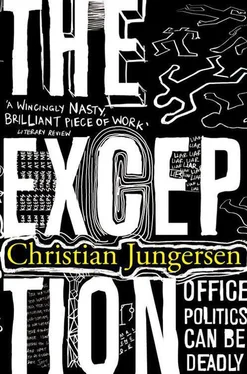Christian Jungersen - The Exception
Здесь есть возможность читать онлайн «Christian Jungersen - The Exception» весь текст электронной книги совершенно бесплатно (целиком полную версию без сокращений). В некоторых случаях можно слушать аудио, скачать через торрент в формате fb2 и присутствует краткое содержание. Год выпуска: 2010, Издательство: Orion Books, Жанр: Современная проза, Триллер, на английском языке. Описание произведения, (предисловие) а так же отзывы посетителей доступны на портале библиотеки ЛибКат.
- Название:The Exception
- Автор:
- Издательство:Orion Books
- Жанр:
- Год:2010
- ISBN:нет данных
- Рейтинг книги:3 / 5. Голосов: 1
-
Избранное:Добавить в избранное
- Отзывы:
-
Ваша оценка:
- 60
- 1
- 2
- 3
- 4
- 5
The Exception: краткое содержание, описание и аннотация
Предлагаем к чтению аннотацию, описание, краткое содержание или предисловие (зависит от того, что написал сам автор книги «The Exception»). Если вы не нашли необходимую информацию о книге — напишите в комментариях, мы постараемся отыскать её.
The Exception — читать онлайн бесплатно полную книгу (весь текст) целиком
Ниже представлен текст книги, разбитый по страницам. Система сохранения места последней прочитанной страницы, позволяет с удобством читать онлайн бесплатно книгу «The Exception», без необходимости каждый раз заново искать на чём Вы остановились. Поставьте закладку, и сможете в любой момент перейти на страницу, на которой закончили чтение.
Интервал:
Закладка:
As so often at work, Iben feels hopelessly spoilt. How could anyone possibly think that what she had experienced in Nairobi was of any consequence? She had been kept prisoner for four days. When she came back home, she was offered all the counselling she needed, paid for by the aid organisation she worked for. Antoni Gawrylkiewicz had never got any kind of support or care.
True, her supposedly therapeutic talks hadn’t been particularly helpful. The therapist had asked about the depression and panic attacks that had hit Iben after the death of her father nine years ago. At that time, talking to friends and to a psychologist had actually helped, but after Nairobi, with the new therapist, it seemed to her that nothing at all came up that she didn’t already know.
Those who challenged the system during the war were left terrifyingly alone with their fears. Iben had found another item about a man, a passer-by, who was suddenly shot dead in the street by an SS officer. The man’s crime was to hand a jug of water to the prisoners in a Jewish transport.
Regardless of the terror, Antoni Gawrylkiewicz, and others like him, had fed and housed Jewish strangers for years. Night after night they must have fallen asleep knowing that the family might be woken up at any time by hammering on the door and be deported to a concentration camp, together with their secret house guests.
No one dared tell anyone else about the deadly risks they were taking. For two years Antoni Gawrylkiewicz cooked for sixteen Jews and, to make sure there were no signs of their existence, carried away their excrement from the earth shelters where they lived. Many of the units in the Polish resistance movement were as driven by anti-Semitic hatred as the Nazis, and one local unit suspected Gawrylkiewicz of hiding someone. He was tortured, but revealed nothing.
After the liberation the Jews he had saved were at last free to return to their homes. Even though resistance fighters kept up their murderous attacks against Jews, at the end of the war there were many survivors because of him.
And as it is said in several religious creeds, including Judaism: ‘He who saves one life, saves the entire world.’
Iben misses the laughter she usually shares with Malene. Ostensibly there is no problem. They talk, as ever, about work-related topics. They haven’t really fallen out with each other. If anyone has the right to be cross, Iben feels it should be her. Malene, always so sure of being attractive to men, is making a big fuss over nothing.
Camilla’s gentle voice floats across the room from her desk. ‘Paul called to say he won’t be in this afternoon. He’ll be in tomorrow morning.’
‘Thanks, Camilla.’
Camilla is at least ten years older than Iben and Malene. She has little in common with the two younger women, but Iben likes her. Camilla is generous and brilliant at her job, always happy to share a joke.
Iben wants to stretch her legs. She goes to the kitchen, fills the Thermos with coffee, and returns with an idea. ‘I thought, maybe the exhibition could be called something like “Everyone Can Make a Difference”. It would refer to what the exhibition aims to do, which is to make people want to create a better future, not just dwell on the past. The name would highlight that.’
Camilla is quick off the mark. ‘That’s a fantastic idea.’
After a moment, Malene responds. ‘Aha … Right …’ She looks up from her writing, which is obviously still frustrating her. Clutching the knuckles of one hand with the other hand, Malene swivels on her chair to look first at Camilla, then Iben. ‘I’ll add it to my list. We’d better run our ideas past Paul soon.’
Paul has a terrific talent for formulating concise and arresting sound-bites that always go down well with the media. He once said in a television interview that the DCGI should survive because ‘The purpose of the Danish Centre for Genocide Information is to develop a vaccine against what, in the past, has been the worst form of political disease. Our goal is to encourage resistance in the communities of the future.’
Paul is in his thirties, lean and fair. His hair is very short and he almost always wears a black sweater. Sometimes he dresses up by adding a black jacket. He plays the role of politically engaged, media-savvy intellectual to perfection. During a typical workday Paul spends more time networking over a lengthy lunch than he spends in his office. His top priority is to increase the public’s awareness of genocide, and he goes about it by making sure he’s part of the current-affairs coverage. He has excellent relationships with a whole string of editors and journalists, which helps him secure amazing amounts of free publicity.
Iben once told some of her friends that Paul, despite coming across as a black-suited embodiment of sobriety, drives an Alfa Romeo and keeps his mobile phone on when he’s out jogging in Hare Woods, the best nature trail in the city.
Her friends instantly labelled him a fraud. But Iben disagrees with them. It is Paul’s job to fit in and he conforms one hundred per cent because he cares passionately about the cause. Without Paul, the new right-wing government would have put the Centre under tighter control immediately after the election. They might even have closed it down, like so many of the other social-democratic projects. But it didn’t happen, probably because Paul spent several days in town, lunching with the right people in the right places at the right time.
Iben already has a vision of him promoting their exhibition in some news feature, and imagines the kind of sales pitch he would give based on the slogan: ‘Everyone Can Make a Difference’.
‘It is increasingly common to hear people say that it is pointless for individuals to act. DCGI’s new exhibition sends a crucial message: personal responsibility still matters. What you decide to do can make a huge difference.’
Malene has worked for DCGI the longest. As a student trainee she was exceptionally capable and, after graduating, she was offered the post of project manager. One of her chief responsibilities is to look after the academics and civil servants who contact the Centre.
Two years ago, when the information officer’s post became vacant, Malene recommended Iben but didn’t tell the selection committee that she was her best friend. She had met Iben at college, she told them, and worked with her in a few student societies. In Malene’s view, Iben was unusually bright, efficient and easy to work with.
Once Iben was shortlisted, Malene briefed her carefully, giving her insider advice about the right things to say. In the end, Iben landed the job ahead of 285 other applicants. She and Malene took care not to show how well they knew each other, and tried to make out that their close friendship had developed in record time once they started working together.
After a few weeks Paul stopped at their desks, chatted for a while and then paused, smiling as he looked at them. ‘You two have learned to get on quickly. Good!’ He tapped on Iben’s new computer. ‘It’s a match I’m proud of. It bodes well!’
Iben’s job at the Centre had been her reward for standing by Malene over the years.
One night six years earlier, Malene had been woken by a stabbing pain. Three of her fingers were red and inflamed. It had grown worse, and by four in the morning the fingers were grotesquely swollen and immobile. She had walked along the corridor and knocked with her other hand on Iben’s door. Iben had phoned the doctor on call. The diagnosis was a sudden onset of rheumatoid arthritis and Malene had been kept in hospital for several days.
She had recovered, but was told that she must have frequent check-ups, and that the illness had no effective cure. It would come and go for the rest of her life. It could target any of her joints, for variable lengths of time, but especially those in her hands, feet, knees, elbows and shoulders. The affected joints would become stiff and very sore.
Читать дальшеИнтервал:
Закладка:
Похожие книги на «The Exception»
Представляем Вашему вниманию похожие книги на «The Exception» списком для выбора. Мы отобрали схожую по названию и смыслу литературу в надежде предоставить читателям больше вариантов отыскать новые, интересные, ещё непрочитанные произведения.
Обсуждение, отзывы о книге «The Exception» и просто собственные мнения читателей. Оставьте ваши комментарии, напишите, что Вы думаете о произведении, его смысле или главных героях. Укажите что конкретно понравилось, а что нет, и почему Вы так считаете.












